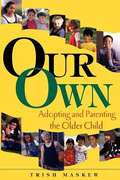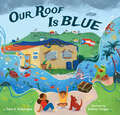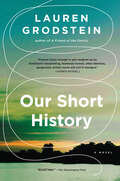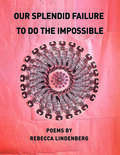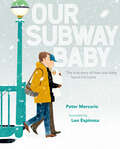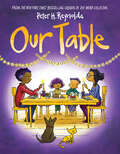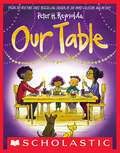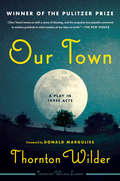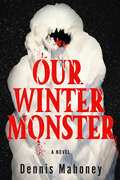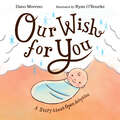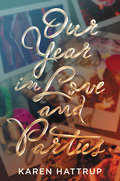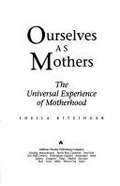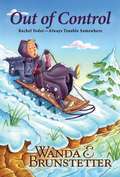- Table View
- List View
Our Own: Adopting and Parenting the Older Child
by Trish MaskewPractical tips for anyone contemplating or in the process of adopting older children written by an adoptive mother
Our Place on the Island: A Novel
by Erika MontgomeryFor decades, the Campbell women have reunited at the family’s rambling seaside cottage known as Beech House to celebrate life’s many occasions. But this year, they will be called back to Martha's Vineyard for a celebration of a different sort: their beloved matriarch Cora is getting remarried. And all the town gossips are calling him the one who got away, years ago… For renowned chef Mickey Campbell, this wedding isn’t just a welcome excuse to return to the place she first learned to cook at her grandmother’s side. It’s also a chance to regroup while she figures out a way to tell her smoldering head chef boyfriend that she’s mismanaged their restaurant into the red. Mickey’s mother, Hedy, is still mourning the passing of her adored father three years earlier, and she isn’t sure she’s ready to welcome a new man into the fold—and she’s not certain her own thorny relationship with her mother will weather the storm of her upcoming marriage.But everyone knows a woman’s heart holds more than meets the eye. For Cora, drawing her daughter and granddaughter back to Beech House isn’t just about a ceremony, but a chance to reveal a history she has kept close to her heart for decades. As the days leading up to the wedding unfold, secrets of Cora’s past come to light-- a secret that will cause three generations of Campbell women to question marriage, motherhood, and ultimately learn to savor the delicious joy of following your own heart.Told in dual timelines on the sumptuous beaches of Martha's Vineyard, OUR PLACE ON THE ISLAND is the sparkling, romantic read of the season.
Our Red Book: Intimate Histories of Periods, Growing & Changing
by Rachel Kauder NalebuffA collection of essays, oral histories, and artworks about periods across all stages of life, gathered by the editor of the New York Times bestselling anthology My Little Red Book.After hearing a harrowing coming-of-age story from her great aunt, Rachel Kauder Nalebuff started gathering stories about menstruation in her family that had never been told. What began as an oral history project quickly snowballed: Rachel heard from family and friends, and then from strangers—writers, experts, community leaders, activists, young people, and other visionaries—about the most intimate physical transformations in their lives. Our Red Book takes us through stories of first periods, last periods, missing periods, and everything about bleeding that people wish they had been told. Weaving together powerful voices—from teenagers, midwives, Indigenous scholars, Olympic athletes, incarcerated writers, disoriented fathers, elected leaders who fought to make period products free, friends transitioning genders, grandmothers, and lovers—the book invites us on a collective journey of growth and change, with Rachel&’s own voice as a guide. The result is a people&’s history of menstruation, told through an array of perspectives and identities that span the globe. Gathered over twenty years, the collection takes stock of our shifting relationships to family, cultural inheritance, gender, aging, and liberation.
Our Roof is Blue
by Sara E. EcheniqueThis heartfelt story of resilience follows two siblings as they work to recover and rebuild after Hurricane Maria destroys their home in Puerto Rico.Before an intense hurricane hits their home in Puerto Rico, Antonio told his sister vibrant stories each night. During the storm, they huddled with their parents in a closet and hear the storm blow the roof right off their home. After the storm, their family uses a temporary blue tarp for a roof, and Antonio stops speaking. Gradually the siblings imagine their blue roof playfully—as the ocean above them or a parachute helping them fall from the sky. As the narrator helps her little brother feel safe once more--and after the family and community build a new roof--the little boy begins to speak again.
Our Short History: A Novel
by Lauren Grodstein“Lauren Grodstein breaks your heart, then miraculously pieces it back together so it’s bigger—and stronger—than before.” —Celeste Ng, author of Everything I Never Told You How can a woman learn to let go of the people she loves the most? Karen Neulander, a successful New York political consultant and single mother, has always been fiercely protective of her son, Jacob, now six. She’s had to be: when Jacob’s father, Dave, found out Karen was pregnant and made it clear that fatherhood wasn’t in his plans, Karen walked out of the relationship, never telling Dave her intention was to raise their child alone. But now Jake is asking to meet his dad, and with good reason: Karen is dying. When she finally calls her ex, she’s shocked to find Dave ecstatic about the son he never knew he had. First, he can’t meet Jake fast enough, and then he can’t seem to leave him alone. Karen quickly grows anxious as she watches Dave insinuate himself into Jake’s life just as her own strength and hold on Jake grow more tenuous. As she struggles to play out her last days in the “right” way for Jake, Karen wrestles with the knowledge that the only thing she cannot bring herself to do for her son—let his father become a permanent part of his life—is the thing he needs from her the most. With heart-wrenching poignancy, unexpected wit, and mordant humor, Lauren Grodstein has created an unforgettable story about parenthood, sacrifice, and life itself.
Our Song
by Keith WaterhouseI knew, logically, that you were bad for me, that you demoralised me, destroyed my peace of mind, deflected me from the things I should have been doing, distorted my sense of perspective; yet at the same time you keyed me up, made me feel alive.'Roger Piper is married, middle-aged and middle-rung; he is a man who has elevated failure to an art form. His wife thinks he is up all night writing a novel. In fact, he's writing a suicide note, a long farewell letter to Angela Caxton, the girl with the marmalade-coloured hair, with whom he has shared a wild but hopeless affair. OUR SONG traces their entanglement from its carefree beginnings to its inevitable yet unexpected tragic end. Pouring out his heart, the former advertising executive - his career, as well as much else, sacrificed to the consuming trauma of his obsessive relationship - looks back upon the astonishing helter-skelter experience of falling unsuitably but violently in love.
Our Song
by Keith WaterhouseI knew, logically, that you were bad for me, that you demoralised me, destroyed my peace of mind, deflected me from the things I should have been doing, distorted my sense of perspective; yet at the same time you keyed me up, made me feel alive.'Roger Piper is married, middle-aged and middle-rung; he is a man who has elevated failure to an art form. His wife thinks he is up all night writing a novel. In fact, he's writing a suicide note, a long farewell letter to Angela Caxton, the girl with the marmalade-coloured hair, with whom he has shared a wild but hopeless affair. OUR SONG traces their entanglement from its carefree beginnings to its inevitable yet unexpected tragic end. Pouring out his heart, the former advertising executive - his career, as well as much else, sacrificed to the consuming trauma of his obsessive relationship - looks back upon the astonishing helter-skelter experience of falling unsuitably but violently in love.
Our Souls at Night: A novel
by Kent HarufA spare yet eloquent, bittersweet yet inspiring story of a man and a woman who, in advanced age, come together to wrestle with the events of their lives and their hopes for the imminent future. In the familiar setting of Holt, Colorado, home to all of Kent Haruf's inimitable fiction, Addie Moore pays an unexpected visit to a neighbor, Louis Waters. Her husband died years ago, as did his wife, and in such a small town they naturally have known of each other for decades; in fact, Addie was quite fond of Louis's wife. His daughter lives hours away in Colorado Springs, her son even farther away in Grand Junction, and Addie and Louis have long been living alone in houses now empty of family, the nights so terribly lonely, especially with no one to talk with. Their brave adventures--their pleasures and their difficulties--are hugely involving and truly resonant, making Our Souls at Night the perfect final installment to this beloved writer's enduring contribution to American literature.This eBook edition includes a Reading Group Guide.time with kids in years but in turn learn how to all over again. Teaching the boy to play catch. Adopting a dog from the local shelter. A camping trip in the mountains, a trip to the county fair, simple pleasures that are a hallmark of Haruf's fiction. As are the things that jeopardize them, from the death of a mutual friend to family tensions that suddenly test Addie and Louis's ability to withstand them. And the subtle denouement then sweeps both of these amazing people forward--heartbreakingly, hearteningly into the unknown.
Our Splendid Failure to Do the Impossible
by Rebecca LindenbergLiving in landscapes of ruin and ruination, memory and problematic nostalgia, Rebecca Lindenberg’s Our Splendid Failure to Do the Impossible plumbs the depths of disruption, decay, and how we go on when the world stops cold. Inspired by the speaker’s experiences of living with type 1 diabetes, the collection chronicles humanity’s daily fight for survival in a world that’s bent on destroying itself.Lindenberg centers love, self-acceptance, and intimacy as incomparable balms across great geographical and psychological distances, and asks the reader to do the impossible: hope.
Our Spoons Came From Woolworths: A Virago Modern Classic (Virago Modern Classics #93)
by Barbara Comyns'I defy anyone to read the opening pages and not to be drawn in, as I was . . . Quite simply, Comyns writes like no one else' Maggie O'FarrellPretty, unworldly Sophia is twenty-one years old and hastily married to a young painter called Charles. An artist's model with an eccentric collection of pets, she is ill-equipped to cope with the bohemian London of the 1930s, where poverty, babies (however much loved) and husband conspire to torment her. Hoping to add some spice to her life, Sophia takes up with Peregrine, a dismal, ageing critic, and comes to regret her marriage - and her affair. But in this case virtue is more than its own reward, for repentance brings an abrupt end to the cycle of unsold pictures, unpaid bills and unwashed dishes . . .
Our Spoons Came From Woolworths: A Virago Modern Classic (Vmc Ser. #526)
by Barbara ComynsBarbara Comyns' delightful classic novel set in bohemian 1930s London, with a new introduction by Maggie O'Farrell.
Our Subway Baby
by Peter MercurioThis gentle and incredibly poignant picture book tells the true story of how one baby found his home."Some babies are born into their families. Some are adopted. This is the story of how one baby found his family in the New York City subway."So begins the true story of Kevin and how he found his Daddy Danny and Papa Pete. Written in a direct address to his son, Pete's moving and emotional text tells how his partner, Danny, found a baby tucked away in the corner of a subway station on his way home from work one day. Pete and Danny ended up adopting the baby together. Although neither of them had prepared for the prospect of parenthood, they are reminded, "Where there is love, anything is possible."
Our Table
by Peter H. ReynoldsCreative visionary of The Word Collector, Happy Dreamer, and The Dot, #1 New York Times bestseller Peter H. Reynolds creates a tender, lyrical story of multigenerational love, tradition, and family coming together with gratitude and thanks.An Amazon Best Children's Book of 2021Celebrated, bestselling creator Peter H. Reynolds brings his signature touch of love and kindness to this special, timely picture book, as families now, more than ever, are rediscovering and reevaluating what means the most: time together with one another.Violet longs for the time when her family was connected: before life, distractions, and technology pulled them all away from each other. They used to gather at the table, with food and love, to make memories, share their lives, and revel in time spent together. But now her family has been drifting apart, and with nobody to gather around it, the table grows smaller and smaller.Can Violet remind her family of the warmth of time spent together, and gather around the table once more?A mystical fable that feels at once timeless and utterly of the present moment, Our Table is renowned, bestselling creator Peter H. Reynolds at his best. Exquisite, expressive watercolor tells a tender story, growing from monochrome into luscious, joyful color as Violet's family is reunited around the beloved table. An ode to traditions that unite families, Our Table brings readers together with a universal message of gratitude.
Our Table (Digital Read Along)
by Peter H. ReynoldsCreative visionary of The Word Collector, Happy Dreamer, and The Dot, #1 New York Times bestseller Peter H. Reynolds creates a tender, lyrical story of multigenerational love, tradition, and family coming together with gratitude and thanks.Celebrated, bestselling creator Peter H. Reynolds brings his signature touch of love and kindness to this special, timely picture book, as families now, more than ever, are rediscovering and reevaluating what means the most: time together with one another.Violet longs for the time when her family was connected: before life, distractions, and technology pulled them all away from each other. They used to gather at the table, with food and love, to make memories, share their lives, and revel in time spent together. But now her family has been drifting apart, and with nobody to gather around it, the table grows smaller and smaller.Can Violet remind her family of the warmth of time spent together, and gather around the table once more?A mystical fable that feels at once timeless and utterly of the present moment, Our Table is renowned, bestselling creator Peter H. Reynolds at his best. Exquisite, expressive watercolor tells a tender story, growing from monochrome into luscious, joyful color as Violet's family is reunited around the beloved table. An ode to traditions that unite families, Our Table brings readers together with a universal message of gratitude.Now available as a digital read along edition with an included recording of the text!
Our Time Is Gone: A Novel (The Furys Saga #3)
by James HanleyWar has come to England, and the Furys soldier on Desmond Fury calls himself a working man, but it has been years since he put in a full shift. A brutally arrogant union leader, he longs to escape the working class and sees World War II as his ticket to better things. He is at a banquet for war recruiters, savoring the atmosphere of refinement, when a call comes from the hospital that drags him right back into the mud. His mother, the indomitable Mrs. Fury, has collapsed. After years of holding the family together—and making life hell for everyone in it—she lies in the hospital, near death. But Mrs. Fury is not finished yet. As Desmond fights for respectability and her other children wage battles of their own, Mrs. Fury will do what she can to keep her family intact—even if it kills her. Our Time Is Gone is the third book of James Hanley&’s acclaimed Furys Saga.
Our Town and the Cosmic One-Acts: The Long Christmas Dinner, The Happy Journey to Trenton and Camden, and Pullman Car Hiawatha (Harper Perennial Deluxe Editions)
by Thornton Wilder“[Our Town] leaves us with a sense of blessing, and the unspoken but palpable command to achieve gratitude in what remains of our days on earth.” — The New YorkerThornton Wilder’s Pulitzer Prize-winning drama of life in the mythical village of Grover’s Corners, New Hampshire—an allegorical representation of all life—is an American classic. It is the simple story of a love affair that asks timeless questions about the meaning of love, life, and death.Our Town explores the relationship between two young neighbors, George Gibbs and Emily Webb, whose childhood friendship blossoms into romance, and then culminates in marriage. When Emily loses her life during childbirth, the circle of life portrayed in each of the three acts—childhood, adulthood, and death—is fully realized.Widely considered one of the greatest American plays of all time, Our Town debuted on Broadway in 1938 and continues to be performed daily on stages around the world. This special edition includes an afterword by Wilder's nephew, Tappan Wilder, with illuminating documentary material about the playwright and his most famous drama.
Our Town: A Play in Three Acts (Perennial Classics Ser.)
by Thornton Wilder“[Our Town] leaves us with a sense of blessing, and the unspoken but palpable command to achieve gratitude in what remains of our days on earth.” — The New YorkerThornton Wilder’s Pulitzer Prize-winning drama of life in the mythical village of Grover’s Corners, New Hampshire—an allegorical representation of all life—is an American classic. It is the simple story of a love affair that asks timeless questions about the meaning of love, life, and death.Our Town explores the relationship between two young neighbors, George Gibbs and Emily Webb, whose childhood friendship blossoms into romance, and then culminates in marriage. When Emily loses her life during childbirth, the circle of life portrayed in each of the three acts—childhood, adulthood, and death—is fully realized.Widely considered one of the greatest American plays of all time, Our Town debuted on Broadway in 1938 and continues to be performed daily on stages around the world. This special edition includes an afterword by Wilder's nephew, Tappan Wilder, with illuminating documentary material about the playwright and his most famous drama.
Our Way Back to Always
by Nina MorenoTo All the Boys I've Loved Before meets Since You&’ve Been Gone in this effervescent romance about childhood best friends reconnecting, full of sunny days, warm nights, first kisses, and mended hearts. Lou Patterson and Sam Alvarez were inseparable—the best of friends—until the most embarrassing middle school promposal ever. Now, four years later, Lou is an introverted romantic who&’s bearing the weight of her mother&’s expectations. Meanwhile, Sam is the golden boy with plenty of friends who&’s still mourning the death of his father. When Lou finds the bucket list she and Sam wrote together as kids, she&’s disappointed to see that she hasn&’t accomplished a single one of her goals. Go to a party? Nope. Pull the greatest prank of all time? Still no. Learn how to be a really good kisser? Definitely not. Lou sets out to finish the list, and in a stroke of fate, Sam decides to tag along, stirring up old arguments and some very new feelings. But with the bucket list to guide them, Sam and Lou might just be able to find a way toward the future and each other.
Our Winter Monster
by Dennis MahoneyChilling holiday horror about an unhappy couple running from their problems and straight into the maw of a terrifying beast, perfect for fans of Paul Tremblay and Sara GranFor the last year, Holly and Brian have been out of sync. Neither can forget what happened that one winter evening; neither can forgive what&’s happened since. Tonight, Holly and Brian race toward Pinebuck, New York, trying to outrun a blizzard on their way to the ski village getaway they hope will save their relationship. But soon they lose control of the car—and then of themselves.Now Sheriff Kendra Book is getting calls about a couple in trouble—along with reports of a brutal and mysterious creature rampaging through town, leaving a trail of crushed cars, wrecked buildings, and mangled bodies in the snow.To Kendra, who lost another couple to the snow just seven weeks ago, the danger feels personal. But not as personal as it feels to Holly and Brian, who are starting to see the past, the present, and themselves in a monstrous new light . . .Mahoney&’s exhilarating story moves like an avalanche, but its desperate characters, claustrophobic setting, and shocking displays of gore will stay with you long after the snow has melted. Our Winter Monster captures the horrifying moments that test if we&’re strong enough to weather the worst—and asks who we might survive the storm with.
Our Wish for You: A Story About Open Adoption
by Dano MorenoThis moving picture book about open adoption shares all parents&’ wish for a child&’s life to be full of love and family.One birth mother is pregnant with a baby and wants to find parents to adopt the child. Eventually she finds two dads who will be just the right parents, because they, too, share her same wishes of love and happiness for the baby. Author Dano Moreno drew from his and his husband's experience with adopting their son to write a gentle, universal story about all the hopes, dreams, and wishes parents have for their children to live happy lives. Sweet and tender, Our Wish For You is the perfect gift for growing families, baby showers, or adoption day celebrations.
Our Year in Love and Parties
by Karen HattrupIn this poignant, funny, and romantic novel, four nights of epic partying will see two teens through their highest highs and lowest lows over the course of one unforgettable year. Perfect for fans of Gayle Forman and Mary H.K. Choi!Tucker knows that some relationships take work. With his best friend, Bobby, and his mom, everything is simple, steady. His dad, on the other hand, seems to only show up when he wants to bring Tucker down. Then there’s Erika Green, who comes back into his life, stirring up old feelings. A small part of him knows he shouldn’t get too attached during senior year. But a bigger part doesn’t want her to disappear again.Erika from before the video loved to shock people. Now, she just wants to hole up in her quiet college life and leave the past where it belongs—in a dumpster fire. But then she reconnects with Tucker Campanelli. Erika can’t explain what it is about him. There’s just this undeniable connection between them, and she really doesn’t want to lose that feeling. Not yet.
Ourselves As Mothers: The Universal Experience Of Motherhood
by Sheila KitzingerThe high priestess of female sexuality and childbirth expounds on the universal experiences of pregnancy, birth, and motherhood. <P><P>Sheila Kitzinger is the author of Pregnancy and Childbirth, one of the world's best-known childbirth educators, social anthropologist, and mother of five daughters.
Out After Dark
by Kai MaristedA young American couple is touring Germany with their two children. During an Alpine hike, the parents, eager to hunt mushrooms down the slope, settle their drowsy children to nap in the glade. When the kids awake, the sun has set and they are alone, their world changed. They are found eventually by strangers and returned to an America they might have never known.
Out Of Control (Rachel Yoder, Always Trouble Somewhere Series Book #3)
by Wanda E. BrunstetterLook out! Rachel's Back, and She's Out of Control! Ten-year-old Rachel is driving her Amish friends and family "buggy" with her lack of patience, which brings her trouble at every turn--from sledding into a creek to ruining a yummy shoofly pie, to flunking a test in school, to being dragged facedown in the snow. Will Rachel spend the entire winter getting into more trouble than her Lancaster County family and schoolmates can handle? Or will she finally discover that patience has its own rewards?
Out Of The Blue: an enchanting and uplifting saga set in the West Country from bestselling author Charlotte Bingham
by Charlotte BinghamA family finds peace through the unexpected struggle to aid a stranger in this captivating and moving saga. From the million copy and Sunday Times bestselling author Charlotte Bingham, for fans of Louise Douglas and Dinah Jefferies.'An uplifting and inspiring book, emotional yet optimistic, which leaves the reader feeling optimistic and empowered' - THE GOOD BOOK GUIDE'I was surprised by this book. I'm not a romantic... but this did leave a little warm glow in my heart by the end.' - ***** Reader Review'A very enjoyable read, I loved the ending' - ***** Reader Review*********************************************************************************HOW FAR WOULD YOU GO TO HELP A STRANGER?Florence Fontaine has not recovered from a family tragedy when she discovers astrangely dressed young man asleep in her guest cottage at the Old Rectory.Against her better judgement she offers him breakfast, only to find herself caught up in his drama. Florence's young and beautiful daughter, Amadea, is immediately suspicious of Edmund, as he appears to be called, fearing that he might be a fraud.Despite her reservations, Florence enlists friends and neighbours to help restore Edmund's memory. As the mystery unfolds, it becomes apparent that Edmund's history is entwined with that of nearby Harlington Hall, but that his real identity is something quite other.Florence and Amadea become united in their quest and are finally able to put the tragedies of the past behind them, repair their once disjointed lives, and embrace a new and happy future...
